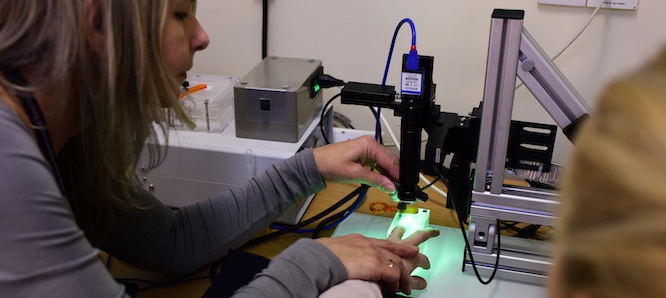Clinicians from Leeds Teaching Hospitals NHS Trust performed a capillaroscopy – inviting visitors to the clinic to place their fingers under a strong microscope, which showed the blood vessels under the skin. The team then looked at the shape and size of these blood vessel capillaries to determine if they had Raynaud's and whether they were at risk of developing scleroderma.
People who showed signs of Raynaud's or an underlying condition were given a referral letter from Dr. Del Galdo to hand to their GP – that would enable them to attend the Leeds Raynaud's clinic for further testing.
Everyone who visited the clinic received a photo of their capillaroscopy, the results from their test, information about Raynaud's and the work of the charity. For those showing signs of Raynaud's or an underlying condition, further medical information was provided by the specialist team to take home.

These are the symptoms to look out for:
- Unusually cold fingers and cold toes, or cold hands and cold feet
- Colour changes in the skin in response to cold or stress
- Colour changes in the affected area to white, then blue/purple and then red
- Numbness, tingling or pain in the fingers and toes
- Stinging or throbbing pain upon warming or stress relief
Dr Francesco Del Galdo, from the University of Leeds Institute of Rheumatic and Musculoskeletal Medicine and consultant rheumatologist at Leeds Teaching Hospitals NHS Trust, said: “This pilot testing programme in Leeds is critical in helping to raise awareness of the need for greater investment into research for Raynaud's and scleroderma, and we're hoping the data we gather could help us develop better diagnostic tests and treatments, saving time to the patients and money to the NHS."
The data we gather from this clinic will also be used in a research study being undertaken by Dr. Francesco Del Galdo to give us better data on the number of people affected by scleroderma and Raynaud's in the UK. This is the first research project looking at providing evidence-based data on a mass scale and will be pivotal in helping SRUK create change for people affected by these conditions.
If you are on Twitter and would like to find out the latest news on the clinic simply search #GetTestedLeeds.
You can also take a simple online test, link below, that will help you understand the symptoms of Raynaud's.

